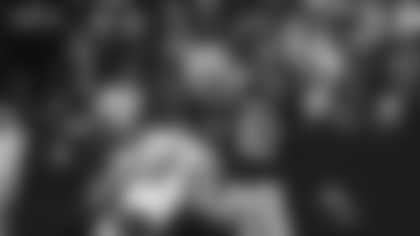October is LGBTQ+ history month. In looking ahead to this Sunday's Pride game against the Cleveland Browns, here's a look back at an LGBTQ+ story from Burgundy & Gold history.
The late Vince Lombardi was a remarkable, standout force in the world of football. His win record, trophies, hall of fame recognitions and dozens of other honors all point to that. So, too, do the accounts of his rare breed of leadership.
Lombardi was, by many standards, different than his peers. That specialness also applied to a way of thinking that might be particularly surprising for someone working in football in the middle of the century: he had rather friendly beliefs towards the LGBTQ+ community.
"Long before it was fashionable, Lombardi was a champion of gay athletes, if only because he was a champion of all athletes, at least those who helped him score more touchdowns than the other guy," wrote sportswriter Ian O'Connor in a 2013 piece for ESPN.
Though the term "LGBTQ+ ally" perhaps wasn't as pervasive as it is today, Lombardi very well could be considered one. He didn't tolerate homophobic comments on his teams; acted as a protector when he could for LGBTQ+ people around him; wanted LGBTQ+ athletes to succeed; and saw their humanity in a time when the queer community was cast as less than and even dangerous. The intersection of Lombardi's LGBTQ+ beliefs and his role as a leader in football had an important impact during the coach's brief but influential time in Washington.

The root of Lombardi's allyship was very personal as his brother Harold (known as "Hal") was gay.
"Through Hal and in what I'd seen, Vin was always fair in how he treated everybody," Hal's partner of 41 years Richard Nicholas told ESPN. "I just thought he appeared to be a great man who accepted people at face value for what they were and didn't judge anybody. He just wanted you to do the job."
Lombardi was known to be intense and demanding -- qualities that cut across everything from how guys were running laps to banter within the team. Lombardi biographer David Marraniss wrote that if Lombardi caught a coach "discriminating against a player thought to be gay, he'd be fired."
If there was any confusion or uncertainty about where Lombardi stood on LGBTQ+ people being treated fairly, it would have been cleared up when he was in Washington. For whatever reason, and one can only speculate, the literature seems to suggest that Lombardi was around more gay men in a football operation in Washington than in his previous head coaching jobs.
According to Out Sports and other sources, three players in Washington's 1969 training camp -- running backs Ray McDonald and Dave Kopay as well as tight end Jerry Smith -- were gay. David Slatterly, Lombardi's assistant general manager, was also gay and so was public relations director Joe Blair. Kopay described Blair as Lombardi's "right hand man."
Lombardi found a player who was struggling in McDonald. His on-field performance in 1967 and 1968 left a lot to be desired, and the young running back had other challenges off the field. He was arrested in D.C. in 1968 for having sex with a man in public.
When Lombardi arrived, the new coach and general manager wanted to help turn things around for the former 13th overall pick.
"Lombardi wanted to give him every benefit of the doubt, and every chance," Marranis said.
One way he helped with McDonald's confidence was by trying to mitigate the homophobia that might be around.
In his book, When Pride Still Mattered: A Life of Vince Lombardi, Marranis notes that Lombardi told running backs coach George Dickson, "I want you to get on McDonald and work on him and work on him -- and if I hear one of you people make reference to his manhood, you'll be out of here before your ass hits the ground."
The presence of this new leader appeared to lift McDonald.
"I'd go right through that wall for the man," McDonald told Sports Illustrated writer John Underwood after the first day of practice with Lombardi. "I'd run till I dropped. I'd do anything for him. He told us we had to love one another, to care for other players on the team if we were going to be a team. He's a genius, a genius. We had a one-hour meeting last night. You know how many plays he gave us? Two. Only two plays in one hour. But we saw those plays like we never saw plays before."
Equal in the eyes of Lombardi, though, meant that the standard was the standard, regardless of sexual orientation, race or anything else. Early in training camp, McDonald showed up late to a meeting and was cut right there in the auditorium in front of the team.

While McDonald's career ultimately fizzled under the Lombardi-led Burgundy & Gold, tight end Jerry Smith's soared.
"Lombardi protected and loved Jerry," Dave Kopay later said.
After a 54-reception, 682-yard season in 1969, Smith was named to his second Pro Bowl and nabbed All-Pro honors for the first time in his career. No one truly knows whether the tight end played better because he felt like his whole self was fully accepted by his head coach. What is clear, though, is that Smith thought the world of Lombardi. According to the Washington Post's Scott Allen, Lombardi's impact on Smith stuck with the tight end until the end of his days.
"Every important thing a man searches for in his life, I found in Coach Lombardi. He made us men," Smith said.
As a highly respected leader, Lombardi knew his voice had power. Discrimination of LGBTQ+ people was the default during his day. For many in his position, turning a blind eye, or even perpetuating, that behavior or these ideas would have been the norm.
Lombardi, though, as he did in so many other facets of his work as a coach, decided to go against the grain. When it wasn't popular, he opted to look out for his LGBTQ+ co-workers and players in Washington. He assumed they were capable rather than assuming there was something inherently wrong with them.
Whether it was a gay running back or a straight defensive end, players could expect Lombardi to coach them with an intensity that few could match. His sister Susan perhaps summed it up best.
"My father treated them all the same. Like dogs," she said to ESPN.














